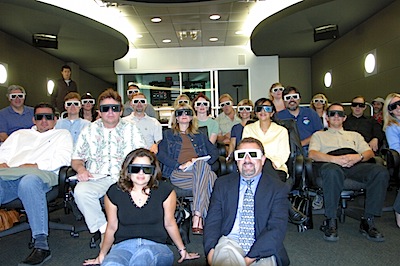 Most of my fellow course directors sit within earshot of my desk and on more than a few occasions we’ve pulled our chairs together and talked about things that seem to work in online learning and things that don’t. For starters, students who have the biggest trouble with online learning are the ones who thought that they were signing up for a go-at-your-own-speed correspondence program. I’m not sure how one can expect to do Masters’ level work, do 12 courses in 12 months, and also do it “at your own speed,” but some students are surprised by the work load. Of course students aren’t the only ones who mistake online learning with less-than-face-to-face learning. A few instructors from other programs have whispered doubts about whether we can deliver a program that is as full a learning experience, given that we work without the benefit of staring down our students on a daily basis. What the doubters-of-online-learning don’t know is that by disconnecting learning from going to a certain place we can keep the learning dialogue going around the clock and fit it into our students every day life. When online learning really works it literally becomes a lifestyle where instruction, questions, practice, and exploration is a continuous ongoing process for the whole time students are in the program.
Most of my fellow course directors sit within earshot of my desk and on more than a few occasions we’ve pulled our chairs together and talked about things that seem to work in online learning and things that don’t. For starters, students who have the biggest trouble with online learning are the ones who thought that they were signing up for a go-at-your-own-speed correspondence program. I’m not sure how one can expect to do Masters’ level work, do 12 courses in 12 months, and also do it “at your own speed,” but some students are surprised by the work load. Of course students aren’t the only ones who mistake online learning with less-than-face-to-face learning. A few instructors from other programs have whispered doubts about whether we can deliver a program that is as full a learning experience, given that we work without the benefit of staring down our students on a daily basis. What the doubters-of-online-learning don’t know is that by disconnecting learning from going to a certain place we can keep the learning dialogue going around the clock and fit it into our students every day life. When online learning really works it literally becomes a lifestyle where instruction, questions, practice, and exploration is a continuous ongoing process for the whole time students are in the program.
 Having earned a masters degree and working toward a doctorate both online, I have more than a little insight into the matter. I’ve heard many say that they could never do online learning because they feel like they lack the self-discipline to get things done without the face-to-face pressure. As someone who is not know for having a well-balanced proactive-get stuff done early work habit, I can say that I have done better with online learning because I’m never not in contact with my classmates and professors. Unlike my ungrad work where the educational experience was largely staring at the back for someone’s head for three-hours every Thursday then forgetting about the class or doing my assignments until the day before the next session, online I found myself working with a small group of friends on a daily basis helping each other get through the process. One would assume that there isn’t any educational experience as lonely as doing it online, but when it’s done right, nothing could be further from the truth. Granted this sense of community isn’t something that happens entirely by accident. What happens is that smart program designers, course developers and students take advantage of the technology and the removal of restraints to have to meet at a certain time in a certain place, and make their educational experience into a “hello” via IM or TM in the morning and an ongoing chat conversation all the way through the day. Because the learning and dialogue is not limited to a certain place or time, it can be made to go on for the entire time one is in the program.
Having earned a masters degree and working toward a doctorate both online, I have more than a little insight into the matter. I’ve heard many say that they could never do online learning because they feel like they lack the self-discipline to get things done without the face-to-face pressure. As someone who is not know for having a well-balanced proactive-get stuff done early work habit, I can say that I have done better with online learning because I’m never not in contact with my classmates and professors. Unlike my ungrad work where the educational experience was largely staring at the back for someone’s head for three-hours every Thursday then forgetting about the class or doing my assignments until the day before the next session, online I found myself working with a small group of friends on a daily basis helping each other get through the process. One would assume that there isn’t any educational experience as lonely as doing it online, but when it’s done right, nothing could be further from the truth. Granted this sense of community isn’t something that happens entirely by accident. What happens is that smart program designers, course developers and students take advantage of the technology and the removal of restraints to have to meet at a certain time in a certain place, and make their educational experience into a “hello” via IM or TM in the morning and an ongoing chat conversation all the way through the day. Because the learning and dialogue is not limited to a certain place or time, it can be made to go on for the entire time one is in the program.
 If any school should understand this way of thinking about learning it should be Full Sail. In the face-to-face program classes are held around the clock, covering in four-weeks what other institutions ramble through in 14, limiting students to one or two classes at a time and expecting them to become fully engaged in learning from the very first day. There are no part-time students. It’s intense in the extreme but incredibly effective for the students and efficient as far as facility utilization. You go to Full Sail because you want to quickly learn about filmmaking, music production, entertainment business or media in education from the best and you want to turn that learning into a career in the shortest time possible. It’s the same in the online program. Except that we don’t require that you move to Winter Park, Florida. You can get that same experience from the comfort of your own home, just don’t expect it to be some part-time half-baked at-your-own-pace correspondence course. Ack. jbb
If any school should understand this way of thinking about learning it should be Full Sail. In the face-to-face program classes are held around the clock, covering in four-weeks what other institutions ramble through in 14, limiting students to one or two classes at a time and expecting them to become fully engaged in learning from the very first day. There are no part-time students. It’s intense in the extreme but incredibly effective for the students and efficient as far as facility utilization. You go to Full Sail because you want to quickly learn about filmmaking, music production, entertainment business or media in education from the best and you want to turn that learning into a career in the shortest time possible. It’s the same in the online program. Except that we don’t require that you move to Winter Park, Florida. You can get that same experience from the comfort of your own home, just don’t expect it to be some part-time half-baked at-your-own-pace correspondence course. Ack. jbb











